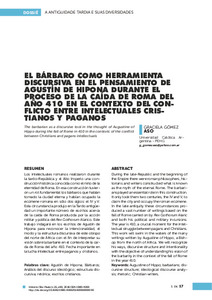Por favor, use este identificador para citar o enlazar este ítem:
https://repositorio.uca.edu.ar/handle/123456789/11041| Título: | El bárbaro como herramienta discursiva en el pensamiento de Agustín de Hipona durante el proceso de la caída de Roma del año 410 en el contexto del conflicto entre intelectuales cristianos y paganos The barbarian as a discursive tool in the thought of Augustine of Hippo during the fall of Rome in 410 in the contextc of the conflict between Christians and pagans intellectuals |
Autor: | Gómez Aso, Graciela | Palabras clave: | HISTORIA DE ROMA; HISTORIA ANTIGUA; IMPERIO ROMANO; Agustín de Hipona, Santo, 354-430; INVASIONES BARBARAS | Fecha de publicación: | 2016 | Editorial: | Universidade Estadual Paulista Júlio de Mesquita Filho, Faculdade de Ciências Humanas e Sociais | Cita: | Gómez Aso, G. El bárbaro como herramienta discursiva en el pensamiento de Agustín de Hipona durante el proceso de la caída de Roma del año 410 en el contexto del conflicto entre intelectuales cristianos y paganos [en línea]. História (São Paulo). 2016, 35. Disponible en: https://repositorio.uca.edu.ar/handle/123456789/11041 | Resumen: | Resumen: Los intelectuales romanos realizaron durante
la tardo-República y el Alto Imperio una construcción histórica conocida como el mito de la
eternidad de Roma. En esa construcción tuvieron un rol fundamental los bárbaros que habían
tomado la ciudad eterna y habían ocupado la
ecúmene romana en sólo dos siglos: el IV y V.
Esta circunstancia produjo en la Tardo antigüedad un importante número de escritos acerca
de la caída de Roma producida por la acción
militar y política del Rex Gothorum Alarico. Este
trabajo indagará en los escritos de Agustín de
Hipona para reconocer la intencionalidad, el
modo y la estructura discursiva de este obispo
del norte de África con el fin de interpretar su
visión sobre la barbarie en el contexto de la caída de Roma del año 410. Fecha importante en
la lucha intelectual entre paganos y cristianos Abstract: During the late-Republic and the beginning of the Empire there were roman philosophers, historians and writers constructed what is known as the myth of the eternal Rome. The barbarians played an essential role in this construction. It only took them two centuries, the IV and V, to claim the city and occupy the roman ecúmene. In the late antiquity these circumstances produced a vast number of writings based on the fall of Rome carried on by Rex Gothorum Alaric and both his political and military incursions. The year is 410, a crucial moment for the intellectual struggle between pagans and Christians. This work will swim in the waters of the many writings written by Augustine of Hippo, a Bishop from the north of Africa. We will recognize his ways, discursive structure and intentionality with the objective of understanding his vision of the barbarity in the context of the fall of Rome in the year 410. |
Cobertura Temporal: | Siglo IV | URI: | https://repositorio.uca.edu.ar/handle/123456789/11041 | ISSN: | 1980-4369 (online) | Disciplina: | HISTORIA | DOI: | https://doi.org/10.1590/1980-436920160000000090 | Derechos: | Acceso abierto | Fuente: | História (São Paulo) Vol. 35, 2016 |
| Aparece en las colecciones: | Artículos |
Ficheros en este ítem:
| Fichero | Descripción | Tamaño | Formato | |
|---|---|---|---|---|
| barbaro-herramienta-discursiva-agustin.pdf | 104,76 kB | Adobe PDF |  Visualizar/Abrir |
Visualizaciones de página(s)
348
comprobado en 30-abr-2024
Descarga(s)
191
comprobado en 30-abr-2024
Google ScholarTM
Ver en Google Scholar
Altmetric
Altmetric
Este ítem está sujeto a una Licencia Creative Commons

